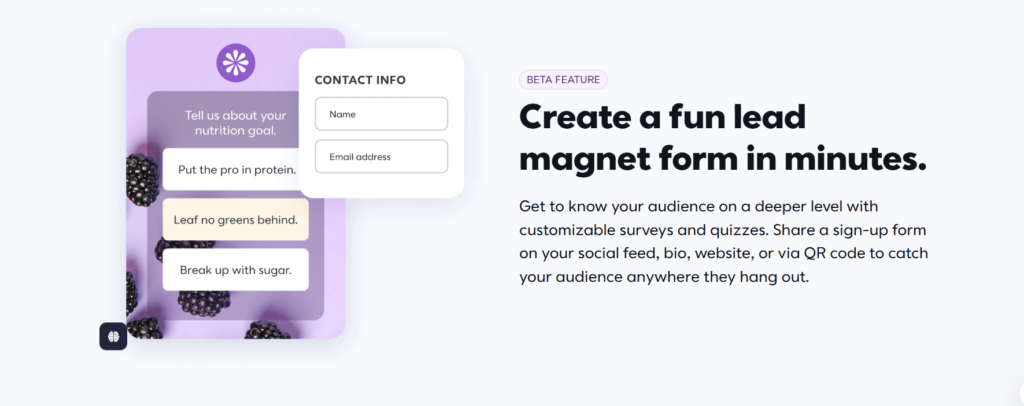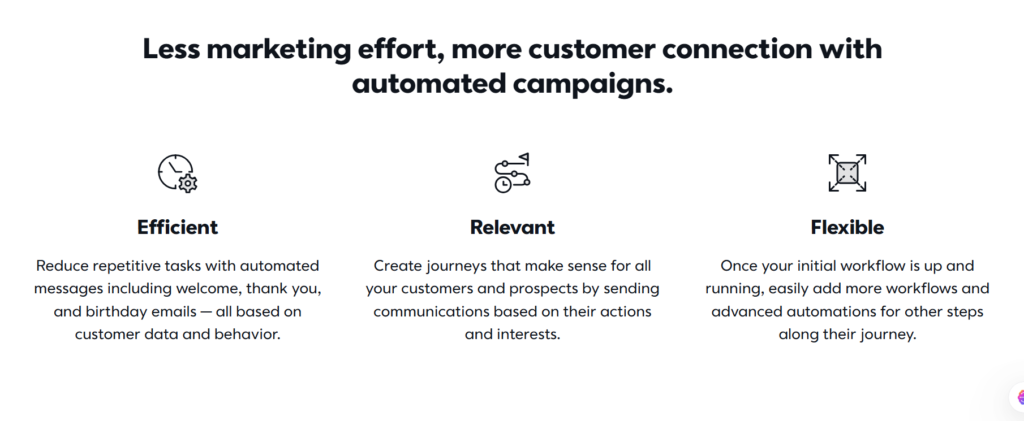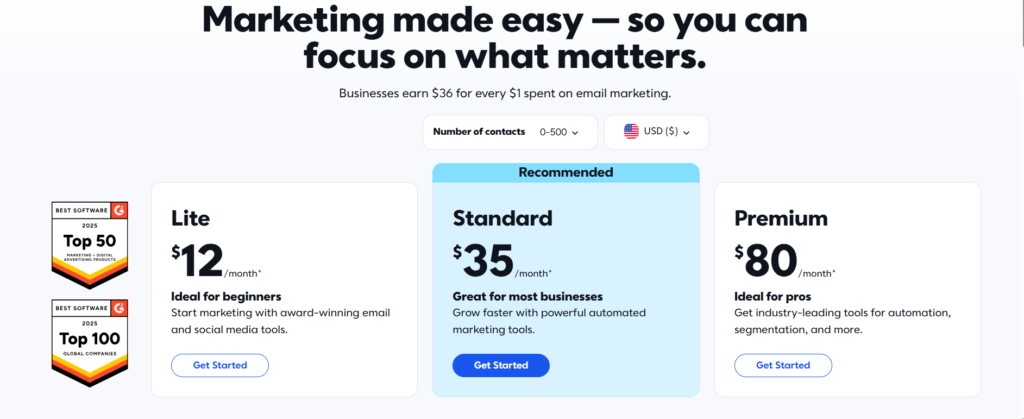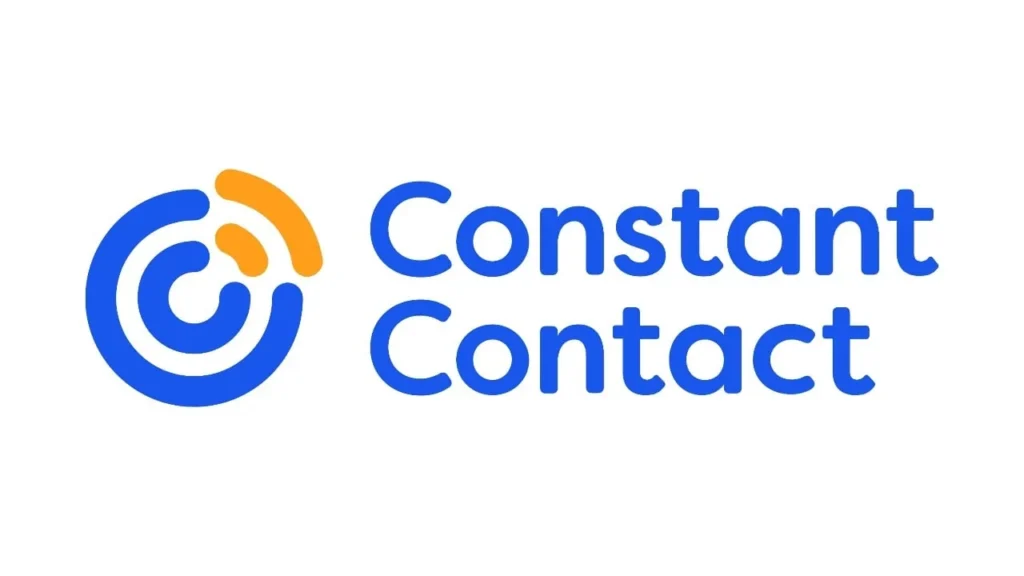Constant Contact Review
Introduction
Constant Contact is one of the most popular email marketing platforms for small businesses, nonprofits, and organizations looking to build stronger connections with their audiences. With a wide range of features like customizable email templates, automation tools, and built-in event marketing, it offers an all-in-one solution for managing your digital campaigns. In this blog post, we’ll take a closer look at what Constant Contact has to offer — from pricing and integrations to reporting, support, and more — to help you decide if it’s the right fit for your business.
Email Template Library
One of the standout features of Constant Contact is its robust email template library. Whether you’re creating newsletters, promotional emails, event invitations, or holiday greetings, the platform offers a wide selection of professionally designed templates to choose from.
Constant Contact provides over 300 customizable email templates that cater to a wide range of industries and occasions. These templates are mobile-responsive, ensuring your emails look great on both desktop and mobile devices.
Editing templates is simple thanks to the platform’s drag-and-drop editor. You can easily adjust layouts, swap images, change colors, and update text to match your brand’s style. There’s also an option to start with a blank template if you prefer a fully custom design.
Another advantage is the availability of industry-specific templates. Whether you run a nonprofit, retail store, or real estate business, you’ll find designs tailored to your needs. This saves time and helps maintain a professional, consistent look across your email campaigns.
For businesses with unique branding requirements, Constant Contact allows you to upload your brand’s logo, use custom colors, and save branded templates for future use.

List Management & Segmentation
Effective email marketing starts with organized and well-managed contact lists. Constant Contact makes this process simple with powerful list management and segmentation tools designed to help businesses send targeted, relevant messages to the right audience.
Adding contacts to Constant Contact is quick and flexible. You can manually add individual emails, upload spreadsheets, or import contacts directly from services like Outlook, Google, or your website sign-up forms. The platform also integrates with popular CRM systems and ecommerce platforms, making it easy to keep your email lists up to date.
When it comes to organizing contacts, Constant Contact allows you to create multiple lists based on customer preferences, purchase history, event attendance, or any custom tags you assign. This helps businesses keep their subscribers organized and ensures that emails reach the most relevant recipients.
The segmentation feature lets you divide your email list into smaller, targeted groups based on specific criteria such as location, engagement history, or demographic information. For example, you can create a segment of highly engaged subscribers or customers who haven’t opened your emails in the last three months. This makes it easier to tailor your messages and improve engagement rates.
Using tags and dynamic lists, Constant Contact ensures you’re always sending the right message to the right people, increasing the overall effectiveness of your campaigns.

Automation & Workflows
Email automation is a powerful way to save time and stay connected with your audience, and Constant Contact offers a simple yet effective set of automation tools to help businesses do just that.
With Constant Contact, you can easily set up automated email sequences based on specific triggers like a new subscriber joining your list, a customer making a purchase, or a recipient opening an email. This means you can welcome new subscribers, follow up on abandoned carts, or re-engage inactive contacts without lifting a finger.
The platform’s automation workflows are built using a user-friendly, step-by-step setup. While it may not have the most advanced visual workflow builder on the market, it covers essential automation needs for small businesses and nonprofits. You can create welcome series, birthday emails, event reminders, and time-based follow-ups with ease.
One of the highlights is the ability to use list segmentation within your automation. For example, you can trigger different emails for customers based on their interests or engagement level, ensuring each message feels personal and relevant.
Constant Contact also allows you to monitor the performance of your automated campaigns through detailed reporting, helping you see open rates, click-through rates, and overall engagement for each workflow.

Integrations & Add-ons
A major advantage of using Constant Contact is its ability to connect seamlessly with a wide range of third-party tools and services. These integrations help businesses extend the platform’s functionality and streamline their marketing workflows.
Constant Contact offers over 5,000 integrations and add-ons, covering everything from ecommerce platforms and CRMs to social media tools and event management apps. Popular integrations include Shopify, Woo Commerce, Salesforce, Eventbrite, QuickBooks, and Facebook Ads. This makes it easier to sync customer data, manage transactions, and run targeted email campaigns without switching between multiple platforms.
For businesses that rely on ecommerce, Constant Contact provides direct integrations with online store platforms, enabling you to automatically send product recommendations, abandoned cart emails, and post-purchase follow-ups. This helps improve customer retention and increase sales with minimal manual effort.
In addition to native integrations, Constant Contact also supports Zippier, allowing users to connect the platform with thousands of other apps. This opens up endless possibilities for automating tasks like adding new customers to email lists, sending SMS notifications, or updating CRM records.
The platform’s API access is available for businesses that require custom integrations, offering developers the flexibility to build solutions tailored to specific needs.

Reporting & Analytics
Tracking the success of your email campaigns is essential, and Constant Contact makes this easy with its built-in reporting and analytics tools. The platform provides clear, easy-to-read reports that help businesses measure performance and make data-driven decisions.
With Constant Contact, you can quickly view key metrics like open rates, click-through rates, bounce rates, and unsubscribe rates for each email campaign. These reports are available in real-time, so you can monitor engagement as soon as your emails are sent.
The reporting dashboard is designed for simplicity, making it easy for users of all experience levels to interpret their results. Visual charts and graphs give a quick overview of your campaign’s performance, while detailed reports allow you to dive deeper into individual metrics.
One useful feature is the ability to track email opens by device type, helping you understand whether your audience prefers reading emails on desktop or mobile. Constant Contact also provides click heatmaps, showing exactly which links in your emails received the most clicks. This makes it easy to identify what content resonates most with your audience.
For businesses running automated campaigns, Constant Contact’s reporting tools provide performance summaries for each workflow, so you can see how your automation sequences are performing over time.

Pricing & Value for Money
Certainly! Here’s clean, informative content for the Pricing & Value for Money section, incorporating Constant Contact as the focus keyword, along with suggested image placement ideas:
Pricing & Value for Money
When it comes to choosing an email marketing tool, pricing and value for money are crucial factors. Constant Contact offers a variety of pricing plans, making it accessible to businesses of all sizes, from small startups to larger enterprises.
Pricing Plans
Constant Contact offers two primary pricing tiers: Email and Email Plus.
- Email Plan:
The Email plan is ideal for businesses that need basic email marketing features. It starts at $9.99 per month and includes core features like unlimited email sends, customizable templates, list management, and reporting tools. This plan is best for smaller businesses or those just getting started with email marketing. - Email Plus Plan:
The Email Plus plan starts at $45 per month and includes everything in the Email plan, plus advanced features like email automation, event marketing, surveys, and dynamic content. This plan is perfect for businesses that need more robust tools to manage larger email lists and complex campaigns.
Both plans offer a 30-day free trial, allowing you to test the platform before committing. Pricing is tiered based on the number of contacts, so the more contacts you have, the higher the monthly cost. For example, if you have 500 contacts, the Email plan costs $9.99/month, but at 2,500 contacts, the cost goes up to $45/month.
Value for Money
When it comes to value for money, Constant Contact provides a robust set of features that can justify the pricing, especially for businesses looking for an all-in-one email marketing solution. The platform’s user-friendly interface, powerful automation tools, integrations, and top-notch customer support make it a great investment for businesses serious about email marketing.
While it may not be the most affordable option available, Constant Contact offers solid performance and excellent customer support, making it a good choice for those who prioritize ease of use and reliable service over price alone.

Customer Support & Resources
Sure — here’s clean, informative content for the Customer Support & Resources section, using Constant Contact naturally as the focus keyword, along with suggested image placements:
Customer Support & Resources
A reliable support system is an important part of any email marketing platform, and Constant Contact excels in this area by offering multiple ways for users to get help and stay informed.
Constant Contact provides 24/7 customer support through various channels, including live chat, phone support, and an extensive online knowledge base. This makes it easy for businesses to find answers quickly, whether they’re troubleshooting an issue or learning how to use a new feature.
One of the standout features is phone support, which is available on weekdays for both the Email and Email Plus plans. This is a valuable option for users who prefer speaking directly with a representative for immediate, personalized assistance.
In addition to direct support, Constant Contact offers a comprehensive resource center filled with how-to guides, video tutorials, webinars, and marketing advice. These resources cover a wide range of topics like creating email templates, building contact lists, running automated campaigns, and improving deliverability rates.
The platform also features a Community Forum where users can ask questions, share tips, and connect with other Constant Contact customers. It’s a great way to learn from real-life experiences and discover creative ways to enhance your email marketing.
For those who want more hands-on guidance, Constant Contact regularly hosts free live webinars and marketing workshops that provide expert advice and practical tips for growing your audience and improving campaign results.

Event Marketing & Extra Features
One feature that sets Constant Contact apart from many other email marketing platforms is its built-in event marketing tools. This makes it an excellent choice for businesses, nonprofits, and community groups that regularly host webinars, fundraisers, workshops, or in-person events.
With Constant Contact, you can create and manage event invitations, registrations, and even ticket sales directly within the platform. The event management tool allows you to design custom event landing pages, track RSVPs, and collect payments through integrations with platforms like PayPal and Stripe. This means you don’t need a separate event management tool — everything can be handled from one place.
In addition to its event marketing capabilities, Constant Contact includes several extra features designed to enhance your overall marketing strategy:
- Social Media Marketing: Schedule and post content directly to Facebook, Instagram, Twitter, and LinkedIn from your Constant Contact dashboard.
- Surveys and Polls: Collect valuable feedback from your subscribers using built-in survey and poll tools.
- Text Message (SMS) Marketing: Send quick announcements, reminders, and promotions via SMS alongside your email campaigns (available on select plans).
- Landing Pages: Create simple, customizable landing pages for promotions, sign-ups, or lead generation without needing a separate website.
These additional tools make Constant Contact more than just an email marketing platform — it’s a well-rounded digital marketing solution suitable for small businesses and organizations looking to manage multiple marketing channels in one place.

Compliance & Security
When it comes to email marketing, data protection and regulatory compliance are essential. Constant Contact takes these responsibilities seriously by offering built-in features and policies that help businesses stay compliant with industry standards and privacy laws.
The platform is fully GDPR-compliant, providing tools that make it easy for users to collect consent, manage subscriber preferences, and handle unsubscribe requests. Constant Contact also complies with CAN-SPAM and CASL regulations, ensuring that emails sent through the platform meet legal requirements for opt-ins and content transparency.
From a security standpoint, Constant Contact uses SSL encryption to protect user data and secure transactions. The company regularly updates its systems and performs security audits to safeguard sensitive information.
For added peace of mind, Constant Contact includes two-factor authentication (2FA) to protect user accounts and offers detailed privacy policies outlining how customer data is collected, stored, and used.
Pros & Cons
Like any software, Constant Contact has its strengths and limitations. Here’s a straightforward breakdown of what businesses can expect:
Pros:
- Extremely beginner-friendly interface.
- Built-in event marketing tools.
- Strong customer support with phone, chat, and email options.
- Comprehensive library of email templates.
- Wide range of integrations and ecommerce features.
Cons:
- Pricing can get expensive as your contact list grows.
- Automation features are effective but limited compared to some advanced platforms.
- Fewer customization options for complex workflows.
- Limited A/B testing options.
Overall, Constant Contact is an excellent choice for small to mid-sized businesses looking for a reliable, all-in-one email marketing platform.

Conclusion
Constant Contact stands out as a dependable, user-friendly email marketing platform with a strong set of features tailored to small businesses and nonprofits. From a rich email template library and intuitive automation tools to standout event marketing features and extensive customer support, it delivers excellent value for users who prioritize simplicity and reliability.
While it may not offer the most advanced automation workflows or the lowest pricing, Constant Contact compensates with ease of use, helpful integrations, and solid performance tracking.
For businesses looking to manage email marketing, event promotions, social media, and customer engagement from one accessible platform, Constant Contact remains a top contender worth considering.


